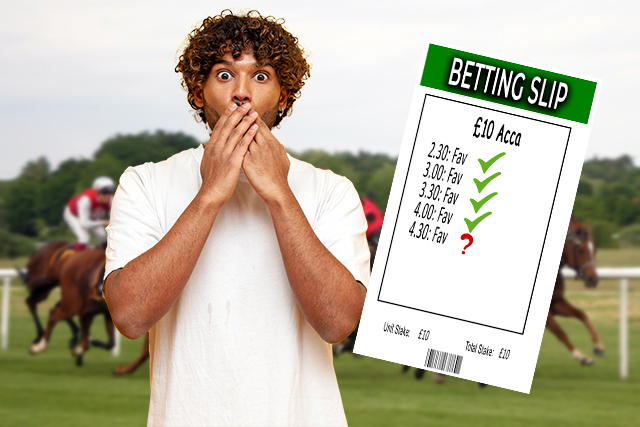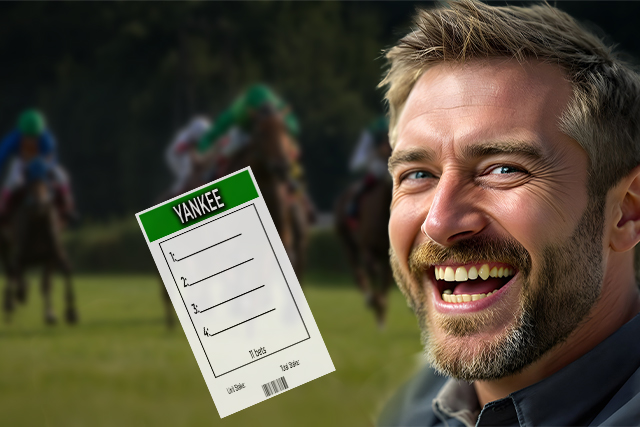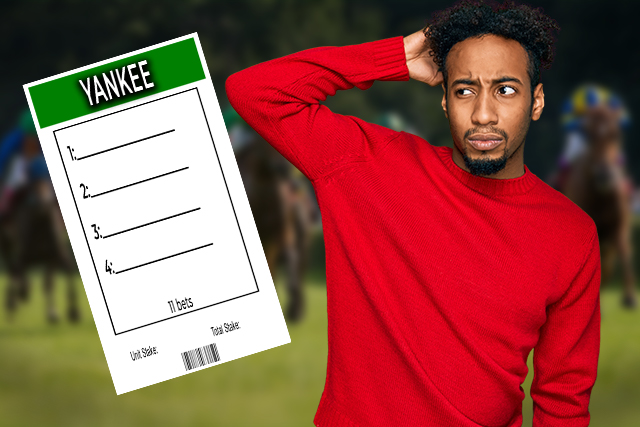A Beginners Guide To The Patent Bet: How To Maximise Profits While Minimising Risk
By Stuart Ward, 3rd February 2025

It's Saturday morning, meaning a weekend of top-notch thrilling sports action awaits. Ah, the stuff of Saturdays, especially if you enjoy a punt.
Could there be a chance to make a few quid among all those betting opportunities?
The only way to find out is to open the newspaper to study the form over a hearty breakfast with plenty of coffee!
Fast-forward an hour (or so): Breakfast is done, coffee downed, and after careful consideration, you're confident you have found three dead certs.
You grab your coat and, with a "strive in your step", head to your local betting shop.
So now you are standing in line at the betting counter, excited by the thrill of three winners leaping around in your mind.
But wait - what of the scorpion's sting of a potential loss? What if one of them should let you down?
Now is not the time for doubt to creep in.
But what do you do? Change your selections?
It's the double-edged sword every punter faces at some point. I still do. The confidence in one's selections, coupled with the anxiety, should one of those selections let you down.
So, how can you hedge your bets to have the flexibility of multiple chances to win while also minimising your risk?
The answer could be the patent bet.
A complicated wager, it may seem. But once you grasp how it works, it may give you the best returns for your pounds. But your selection process has to be spot-on!
So, in this article, we will dive into the ins and outs of the patent bet. And, more importantly, whether it is worth your money to be part of your wagering arsenal.
What is a patent bet?

A patent is a full-cover wager that requires three selections. It comprises one treble, three doubles, and three singles, a total of seven bets.
This punt may seem complex and confusing. But it does come with a bit of insurance. And that guarantee is if only one of your selections is a winner, you will receive a return, albeit a small one. But that would claw back some of your stake money.
However, if all three selections win, your payout can be significant. You could have some serious cash to collect from your bookie.
How many winners do you need in a patent bet?
In a nutshell, just one winner will generate a return. But that doesn't guarantee a profit in every case. It will depend on the price of your selection.
However, it claws back some of your stake money if your wager has only one winner.
How does a patent bet work?
You've got three selections covering seven bets – singles, doubles, and a treble.
So, if you have one winning selection, your bookmaker will settle your bet based on that selection's price. That may be a consolation, but it will get you some of your stake money back.
If all three selections win, wow, you will be grinning like a Cheshire cat. You've got serious cash to collect.
Let's explain this with an example bet:
You have placed a £1 patent predicting the winners of three football matches, a total stake of £7.
Liverpool to win at 2/5.
Newcastle to win at 4/9.
Crystal Palace to win at 21/20.
The football kicks off, and a tense, nail-biting ninety minutes begins!
Just over an hour and a half later, the results are coming through:
Liverpool won their match at 2/5 - a good start and a guaranteed return!
2/5 x £1 = a return of £1.40
That's not much, I hear you scream, but that's the problem when you wager on short-priced favourites.
From your £7 stake, you are £5.60 down.
You need the other two selections to strike to make this work.
Boom - Newcastle have won their match!
You now have two winning singles and one double while you wait for the result of your third and final match. Your rolling returns at this stage are:
2/5 x £1 = £1.40
4/9 x £1 = £1.44
2/5 x 4/9 x £1 = £2.02
A running return of £4.86 with one more match to go.
You're still £2.14 down! You need a positive result from this last match to make a profit.
It's deep into stoppage time; the score is 1-1, and the seconds are ticking away.
And then, boom - Crystal Palace scored in the final seconds to take the lead and surely clinch the win! What an ecstatic and thrilling feeling.
But wait, there is a VAR check.
The nerves creep in as you wait for the referee's decision.
But the goal stands! Happy days. You have three winning selections in your patent bet.
But how much cash will you collect from your bookie?
Let's break it down:
Three singles
2/5 x £1 = £1.40
4/9 x £1 = £1.44
21/20 x £1 = £2.05
Three doubles
2/5 x 4/9 x £1 = £2.02
2/5 x 21/20 x £1 = £2.87
4/9 x 21/20 x £1 = £2.96
One treble
2/5 x 4/9 x 21/20 x £1 = £4.15
We now add all the above to give a total return of £16.89.
The above example is for a £1 unit stake. Should you wager a higher stake, your returns would naturally be higher.
And in the above example, the selections were all short-priced favourites. Two of them being odds-on. If you were to include higher-priced selections, your returns could be significant if your bet was successful.
Of course, to find such value selections would take serious form study and a high level of understanding of the sports you are wagering on.
Are patent bets worth it?
Now that's the big question. Could this punt become a serious part of your wagering strategy, or is it just a gimmick that ultimately favours the bookmaker?
It genuinely depends on your betting goals. Are you aiming to make a steady, consistent profit from gambling? Or do you want to add a bit of fun and thrill to the weekend's football with the chance to pocket some cash?
If the latter is your case, a patent could be the answer.
This wager offers some insurance if one or two of your selections let you down. It also adds extra spice while watching football or horse racing in the pub over a cheeky pint.
And should all your selections win, the next round will be on you!
On the other hand, if you are looking to make sports betting a serious side hustle, then, in my opinion, singles would be a better way. It will take longer to build a decent profit, but the strike rate would be higher.
Of course, whichever way you decide to bet, it all comes down to your selection process for finding potential winners.
Summary
A patent bet offers an exciting opportunity for substantial returns while managing risk. One winner would be sufficient to recoup some of your stake money.
And, of course, three winning selections could bring you some serious cash!
It all depends on your betting strategy. Is it for fun to make a day at the races more exciting, or is it to make betting a serious side hustle for long-term profits? Those are the questions to ask yourself.
Either way, your ability to pick regular winners is the key to making money from betting. That takes superior knowledge of the sports that you are betting on.
If horse racing is your thing, I can help you become more profitable by understanding the types of races, a proven selection process, and an effective staking plan. Click here to discover more.



